How eSports is Changing School Design and Creating Opportunities for Private Companies to Get in the “e”- game.
Background
When we look at the evolution of eSports and eGaming it is surprising that it dates to the 1970s when students at the Stanford University competed in a video contest call “Spacewar” and the grand prize winner won a year’s subscription to Rolling Stone magazine. As video games gained in popularity in the 1980s and 1990s, so did video game tournaments and gaming companies. Nintendo and Blockbuster were among the first major companies to sponsor video game world championships. In 1997 the world’s first eSports event occurred with the Red Annihilation tournament where the winner drove off in the developer’s Ferrari as the grand Prize. Fast forward to now, eSports revenues continue to grow and they are expected to grow past $1.5 Billion Dollars by 2023. The eSports market includes a variety of different types of Franchised leagues, Tournaments, Collegiate and School leagues.
When looking upon the success of eGaming, we can look back as recently as 2018 when Beijing National Stadium, known as the Bird’s Nest, was sold out, which can hold 80,000 fans, for the finals of the League of World Championships. This is double or close to triple the number of fans that attend the Super Bowl. This same event in 2020 brought a record-breaking viewership of 3.8 million viewers.
As we begin to understand the success of eSports and the impact it has on our current youth population, we need to understand how we incorporate these types of spaces into our schools and community gathering spaces.
When looking at the evolving world of business, and the effects of the pandemic moving traditional work environments to virtual environments, we can begin to understand the value of eGaming. When we think about the value to the workplace of having a group of individuals, located anywhere in the world, seamlessly working towards one common goal – and then understand this is happening in eGaming everyday, we understand the youth that have been brought up in this environment can instantly adapt and succeed. These skillsets will be inherent in the new generations that have grown up with eGaming and eSports. Studies have shown that students who compete in eSports have benefits to their cognitive abilities and critical thinking, including increased memory and problem solving. These types of activities lead to increased leadership, communication skills and confidence, specifically understanding the complexities of working together in a virtual environment. Often those who participate in eSports tend to follow career paths in the Science, Technology, Engineering and Math (STEM) fields.
Working with our clients, Crabtree, Rohrbaugh & Associates (CRA) understands this value and has engaged with several educational and private clients for the development of eSports gaming facilities throughout the Mid-Atlantic. Projects have included eGaming labs at local High Schools, Gaming hubs at Student Centers at Colleges and Universities, and eSport spaces at private entities that are being designed to be used for gaming, production and viewing. The project experience provides a balance of lab spaces as well as the large group areas for spectators to view the gamers and the games being played.
K12 Public Education
eSports are popular at every level of K to 12 schools starting with students access to games like Minecraft and Fortnite to more challenging role playing and first-person player games. Across the nation it is estimated that High School eSports league will have over 15,000 students from over 800 schools nationwide. (Understanding eSports, Ryan Rodgers, 2019)
Many School systems throughout the Mid-Atlantic currently provide eSports or eGaming opportunities to their students, and if they are not currently, they are most likely discussing it.
CRA is currently designing a new 250,000 square foot Intermediate and High School which will serve grades 7-12 for Pequea Valley School District. The new design will incorporate an eSports laboratory and a large learning stairs which will be able to “shoutcast” the games for spectators. The district’s eSports team was approved in November of 2019. Lancaster County, Pennsylvania, where the School District is located has an active eSports with over 130 students competing at 13 active clubs.
 Pequea Valley Middle/High School Rendering
Pequea Valley Middle/High School Rendering
The Pequea Valley eSports League will have a dedicated 750 square foot home adjacent to the student commons. Connections between the student commons and the eSports laboratory was a priority to the Pequea Valley coaches. The eSports League is both visually and physically connected to the student commons through a large glass overhead door that allows teammates to freely flow between the lounge and gaming environments during practices. During competitions the same glass overhead door provides the privacy required during competitions. The student commons will serve as the team lounge complete with soft seating, screens to live stream content, collaboration zones for coaching, and free flow access to the eSports laboratory through the overhead door. The same commons will provide scalable spectator seating during competitions comfortably seating small viewing parties of 10-15 through the soft seating and accommodating 100+ attendees on the social stairs.
Higher Education
Recent completed projects designed by CRA that include eSports and eGaming are Immaculata University’s IHM Student Center and the Hagerstown Community College Student Center. Student recreation programs are at the heart of the campus life experience at all College and Universities. Both organized and competitive e-gaming has erupted across these campuses. At both Immaculata University, a resident and commuter-based campus, as well as Hagerstown Community College, a pure commuter-based campus, new spaces to accommodate e-gaming activities were designed into the building programs.
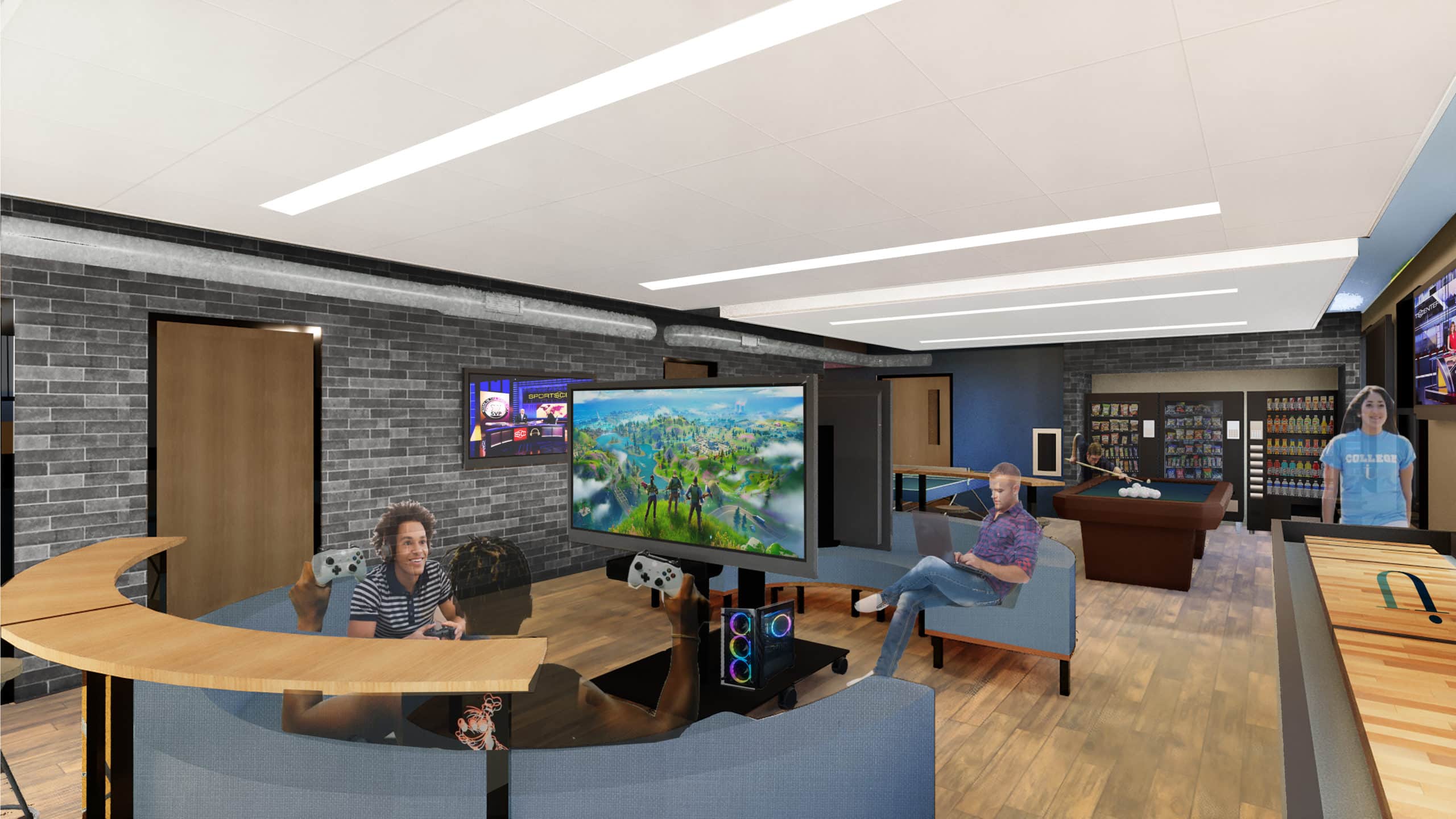 Immaculata University IHM Student Center
Immaculata University IHM Student Center
As the eSports segment continues to grow, many Colleges and Universities are embracing the popularity and are looking to use this as a marketing opportunity to recruit and attract students. It is estimated that there are over 1,600 eSports clubs at over 600 universities in the United States. (Understanding Esports, Ryan Rodgers, 2019)
Private
eGaming interest in the private sector has exploded over the past few years. Corporate interest in large scale dedicated eSports venues such as the proposed Comcast Fusion Arena, a 50-million-dollar next generation eSports arena located in Philadelphia PA has impacted the proliferation of smaller eGaming hubs within local communities. The advances in technology and high-speed internet have allowed for these smaller eGaming hubs to be part of a larger ecosystem of technology, connection and sharing of information. Corporate sponsorship of professional eGaming teams is in high demand. Community and Science Centers have recognized the impact of eGaming spaces as educational outlets, training venues for professional teams and safe spaces for the community.
The Whitaker Center for the Science and Arts, located in Harrisburg, PA vision and goal was to create a flexible use eGaming space to accommodate technology-based education and various scales of eGaming use. The eGaming space, known as the Purposeful Gaming Studio, is planned as one out of three components within the building called the Innovation Zone. The Innovation Zone, consisting of the Purposeful Gaming Studio, the Digital Theater, and future phased Production Lab is a joint conglomeration of digitally infused technology spaces within the building that will complement and enhance each individual space within the Innovation Zone. For example, an eGaming tournament within the Purposeful Gaming Studio can be broadcast in the Digital Theater for allow for greater audience capacity, corporate sponsorship, and community exposure. Another example would be a potential partnership with local hospitals/ higher education institutions to stream their content to the Innovation Zone for educational exposure.
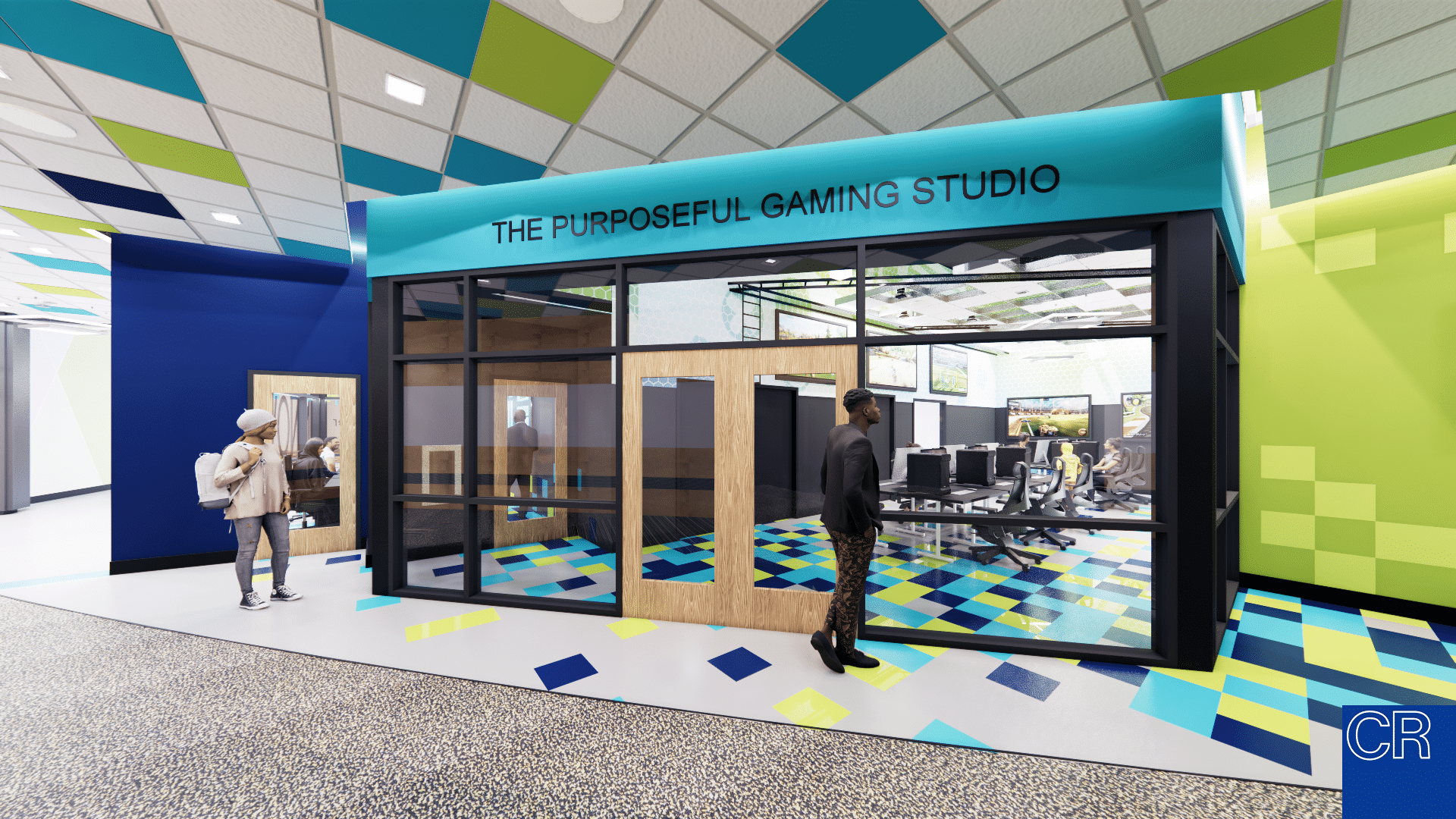
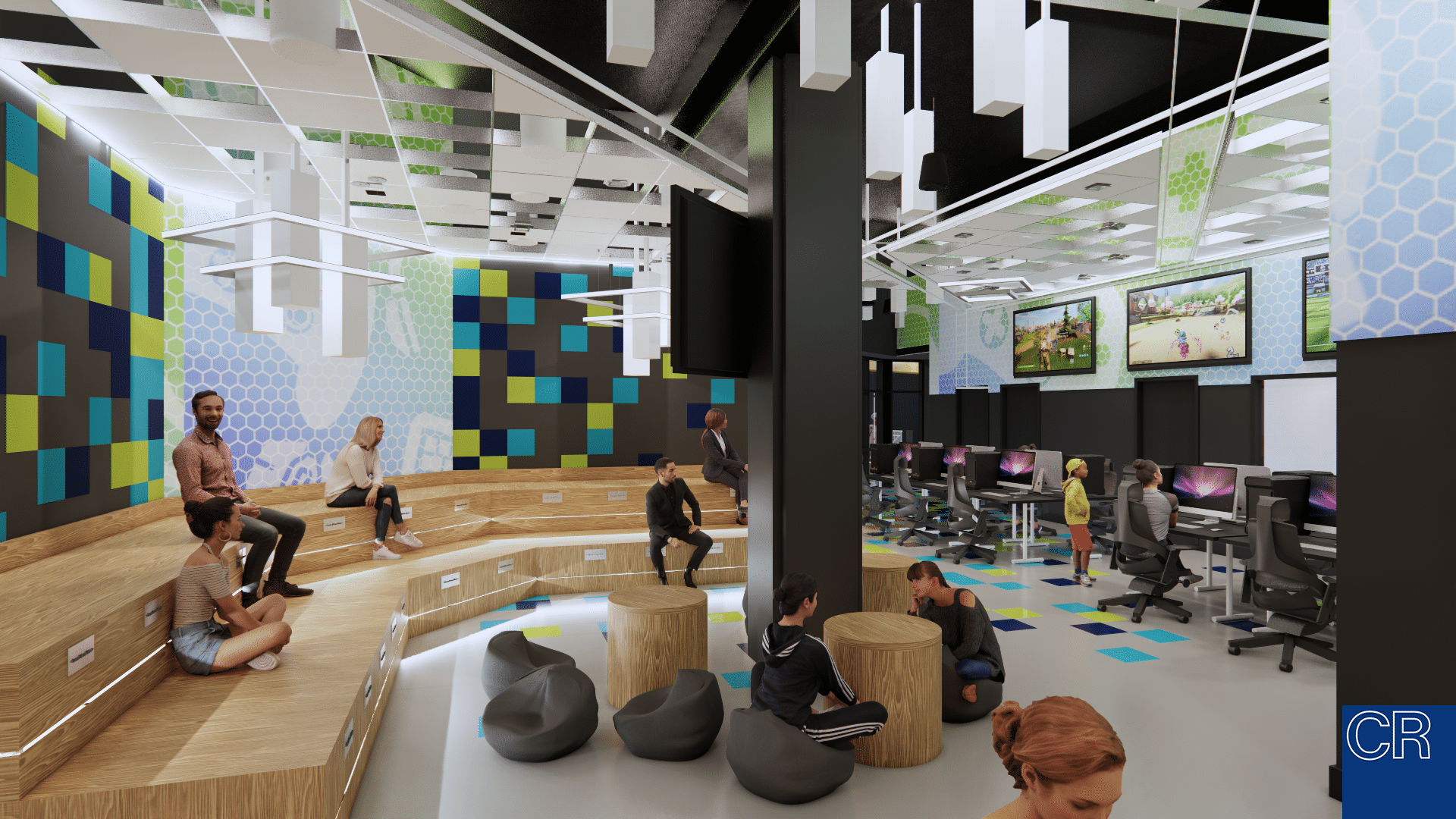
The renovated eGaming space, located at the main hub of the building was designed with two flexible use zones that can be set up in various desk layouts to accommodate team based eGaming and general computer uses for gaming and education. Tiered seating was designed between the two flexible use zones to house spectators during a professional eGaming session or to be used as an open collaboration lecture style format for technology education. A high-tech conference room was also designed to accommodate a smaller scale and more intimate setting. Color and graphics drape the ceilings, walls, and flooring to enhance the experience within the space.
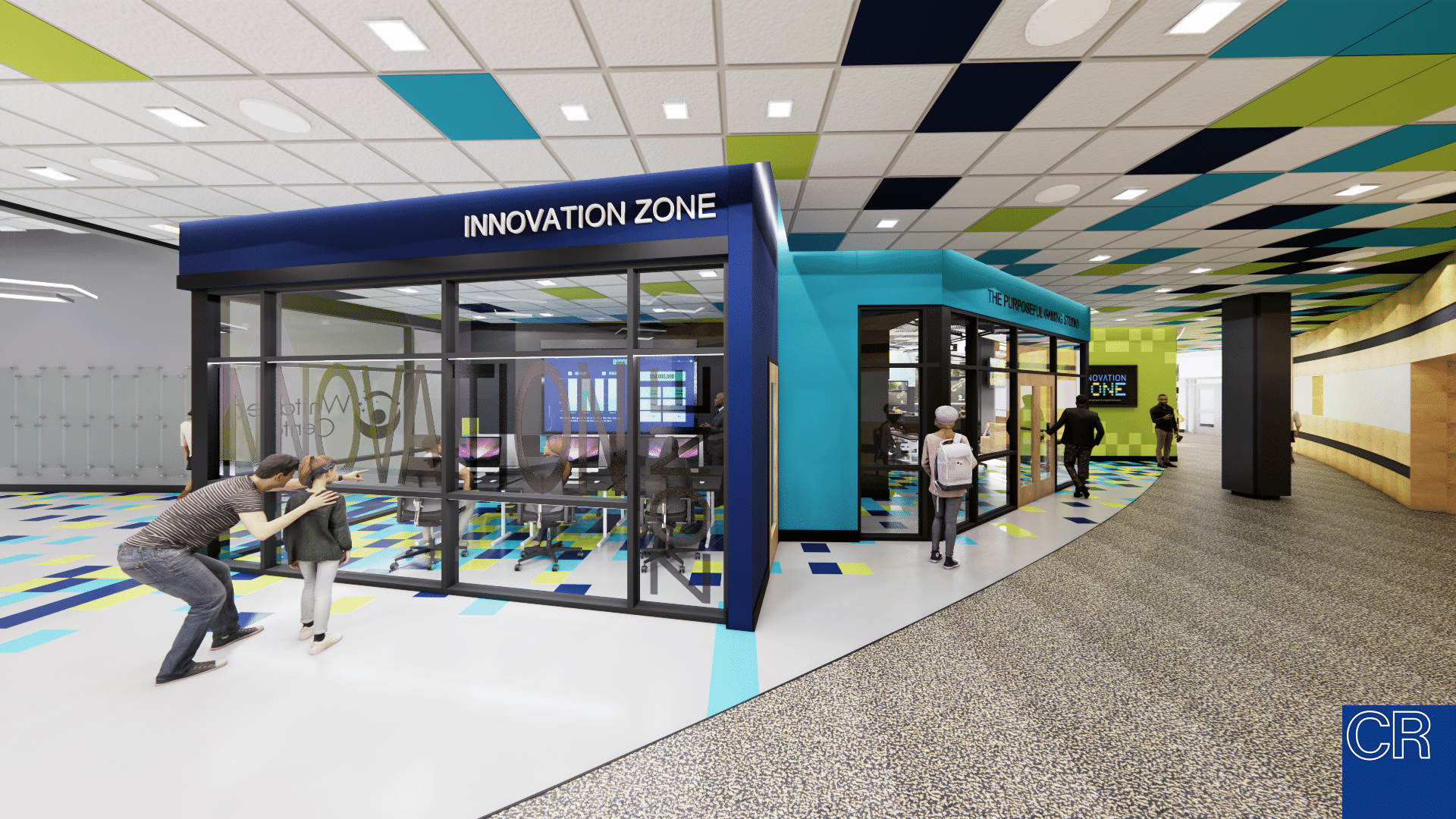
The expression and integration of technology was an important element of the design. The space is equipped with the latest networking equipment and high-speed internet for connectivity. Televisions and displays are mounted on several walls to always be in peripheral vision within the space. Networking cables and computer racks are celebrated by being exposed and color coded for aesthetic purposes. The Lighting is designed to be color changing, and programmable based on the specific event.
The Purposeful Gaming Studio is poised to be a leading eGaming venue in the Central PA region.
Considering adding or renovating a space for an eGaming laboratory?
When considering adding an eSports team there are basic equipment and space needs for competing and spectating. Technology is a critical component and having the correct type of computing equipment and high-speed access to the internet is critical. We are currently working with Clair Brothers in the Rock Lititz facility for the Whitaker Center to identify and specific the technology needs. Working with a technology consultant will streamline your process and better identify your equipment and space needs. You will need to consider what type of gaming facility you will need, will you host competition and/or tournaments, will games be live streamed and will their be a space designated for spectators to view competitions.
Understanding the above needs, the average eSports program start up is less than $50K based on National Association of Collegiate eSports.
The types of spaces needed for an eSports program can vary. Typical labs need access to technology and other mechanical and electrical infrastructure, but generally do not exterior access or windows. Often internal spaces that do not make good academic classrooms make great eGaming Labs. If you are considering production, allocating a production studio that has camera access to the space is ideal. We often recommend sharing larger gathering spaces for viewing, these spaces can be learning stairs, large group instruction areas, collaborative learning spaces or even large public viewing spaces such as the auditorium, performing arts spaces and even the digital theater.
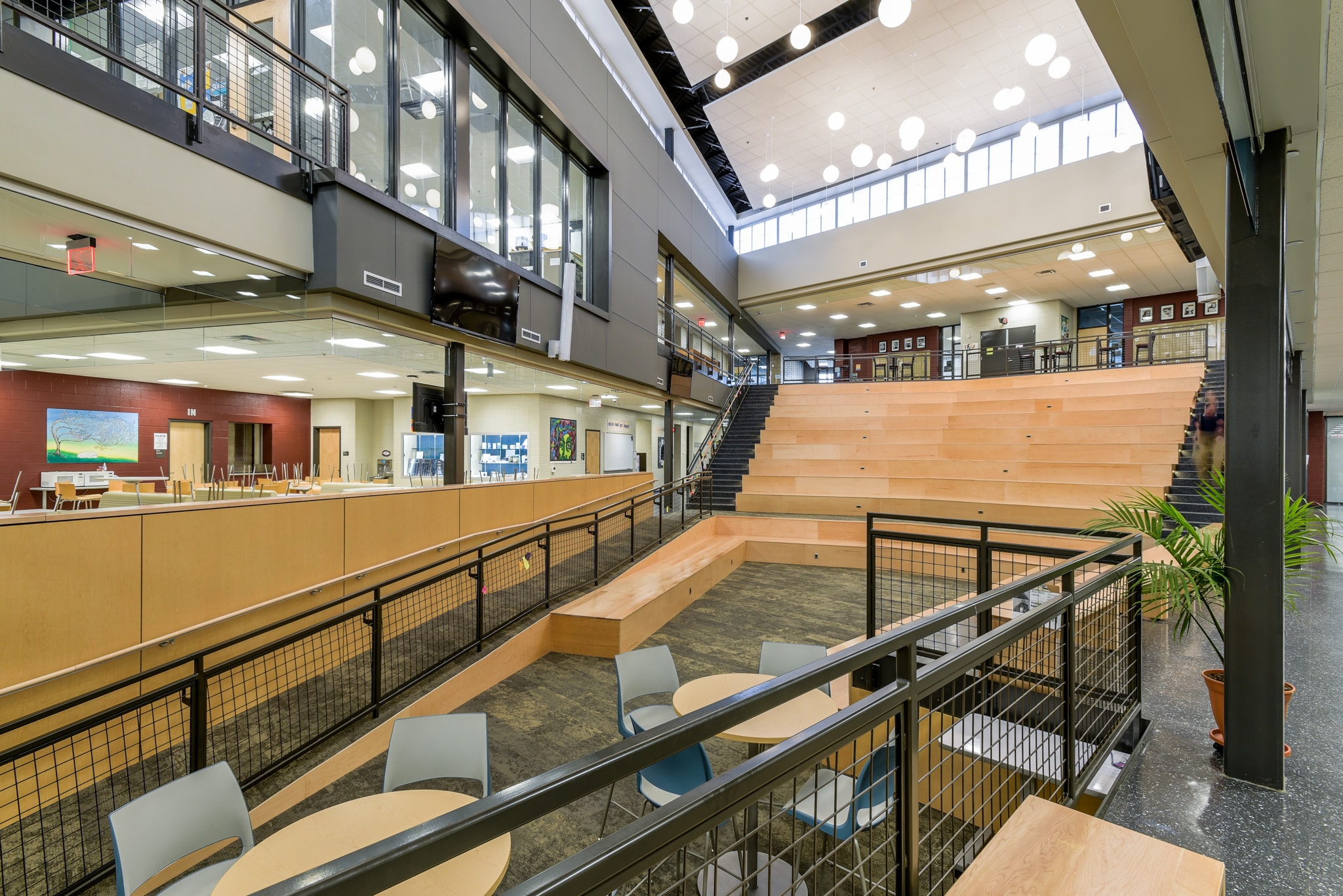 Learning Stairs at State College Area High School
Learning Stairs at State College Area High School
Conclusion
If you currently do not offer eSports or eGaming or are not considering it – you should be. With the growth of eSports across public education, colleges and universities, and private institutions, comes opportunities to develop academic and extracurricular programs that will increase your student satisfaction and overall marketability. If you are considering adding this type of program and are unsure, CRA is happy to work with you to complete a feasibility study to assess program viability, suitability of current or proposed spaces and an assessment of overall cost. As part of this process, we can engage with technology and business consultants to provide a more complete and thorough analysis. If you have any questions, please reach out to marketing@cra-architects.com.
References:
Understanding Esports, An Introduction to the Global Phenomenon, Ryan Rogers, September 18, 2019





